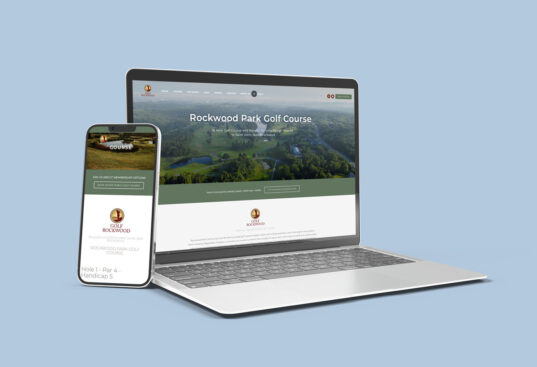The more I talk to clients about their website content and how they feel they can’t write, the more I realize what the public schooling system did to us as we learned academic writing.
I wanted to write this article to try to help businesses like you understand why you think you can’t write and some of the things you’ll need to unlearn in order to write effective content for your website, marketing, etc.
Before you stop reading because you feel like you “won’t be able to write either way” consider this self-test:
Can you talk to a customer in person or on the phone in a way that results in them working with you? If you answered yes, you can do the same with your writing.
Why you think you can’t write
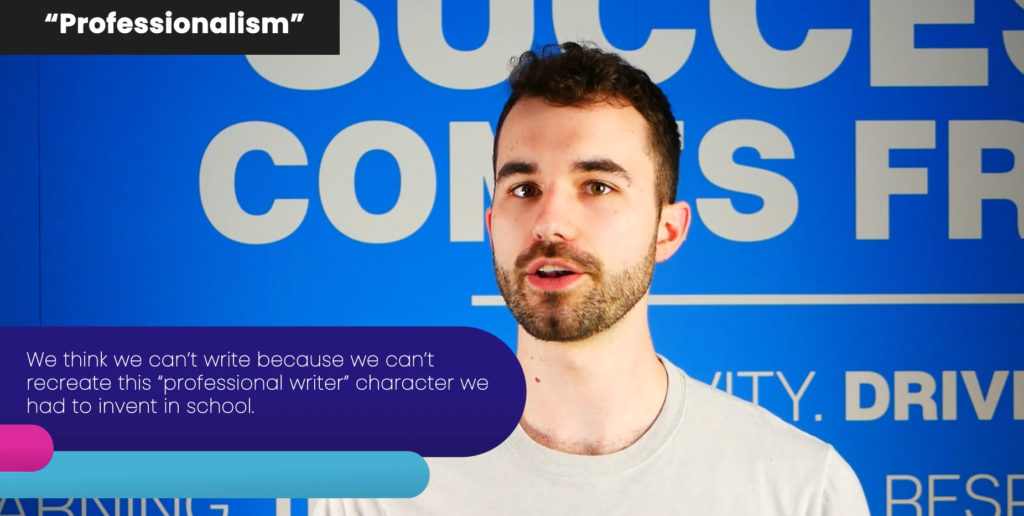
“Professionalism”
This one has always been my worst enemy. In school, I got lots of feedback from teachers and professors that my writing was “too colloquial” which basically means it wasn’t academic enough and too close to the way I would hold a regular conversation.
They told me that I couldn’t use contractions (ex. I’m, we’re, couldn’t, should’ve) and instead I should use the full words (I am, we are, could not, should have). Remember this one forever because it makes the difference between “I’m happy you’ve chosen to work with us” and the robotic “I am happy you have chosen to work with us”.
To me (and many others), this meant that we had to learn how to communicate in a very different way than what comes naturally to us, which can come across as boring and fake.
Section Conclusion: We think we can’t write because we don’t remember how to channel this “academic writer” persona we half-baked for a few years out of our lives.
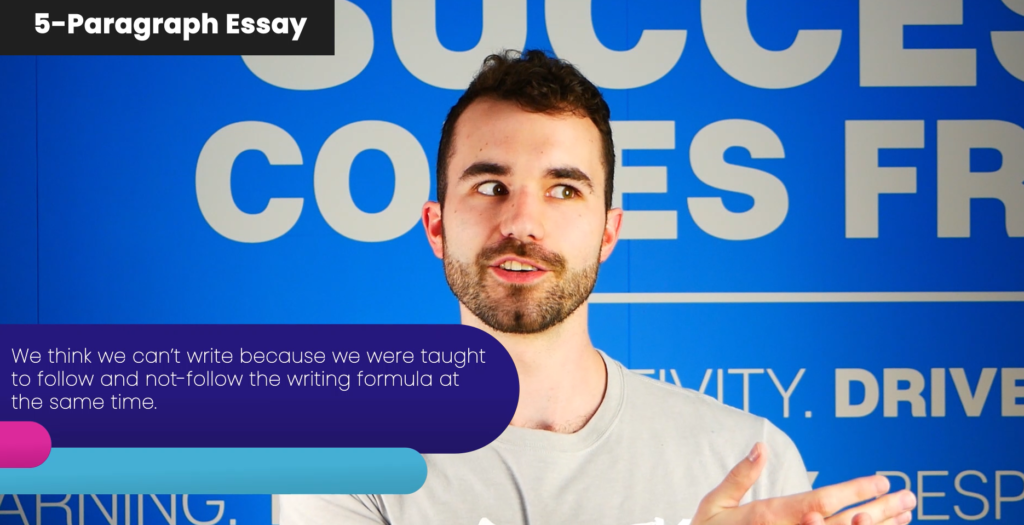
The dreaded 5-paragraph essay
Why was it that every year of highschool, the English teacher would say, “everything you’ve learned about writing essays is wrong” and then teach some slightly different formula of the same thing? Did anyone else have this experience, or just me?
I remember learning that you needed your introduction, you needed 3 body paragraphs with 3 different pieces of supporting evidence and then you needed a conclusion. This created so many restrictions that we focused on fitting our argument into the formula and took away from the creativity necessary for selling (convincing people of) our argument.
Remember that I used the word selling here.
Section Conclusion: We think we can’t write because we were taught that writing shouldn’t—but should—follow a formula, and it doesn’t make any sense.
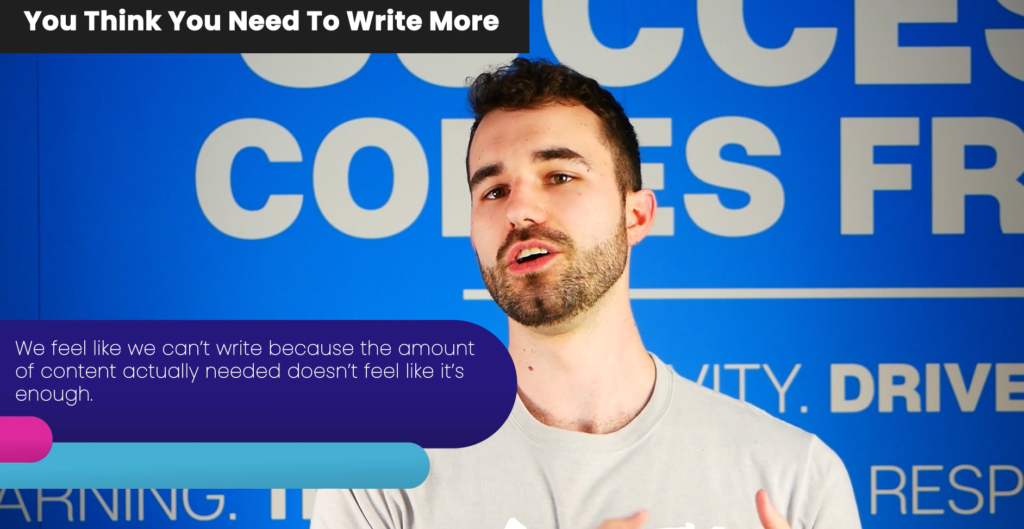
Feeling like you need to say more than you actually do
So, not only did we need to write our argument to fit the required formula, but we needed it to reach the minimum of 4000 words (depending on the requirements of your class, of course).
With this in mind, one of two things happened when you were planning out how to meet the quota:
- You were academic-minded and knew that the best way to fill out these 4000 words was to include research, references, and quotes to support your argument.
- You knew what you wanted to say but you didn’t feel the rest of the research and references would make a big enough difference to spend the time on.
If you haven’t guessed, I was #2.
People in the first category are absolutely important in our world. Medical, scientific, analytic, and many other forms of writing require high levels of research because misinformation in these areas can be extremely damaging.
So let’s leave the #1s to their important work and talk about people like us. To stretch our 500 word essay to fit the required 4000 words, we learned to beat around the bush, use big “smart” sentences and find a dozen different ways to say the same thing.
I put “smart” in quotation marks because a comment I got a lot was “your sentences are awkward and complicated” and I was like “oh good even the teacher can’t keep up with me” but obviously the goal of an argument is to make your point understandable, so no, they were not smart.
Section Conclusion: We think we can’t write because we look at something we’ve written and feel like it couldn’t possibly be enough, so we let ourselves believe that someone who -can- write would be able to add more (without it being meaningless fluff).
Tips for unlearning these
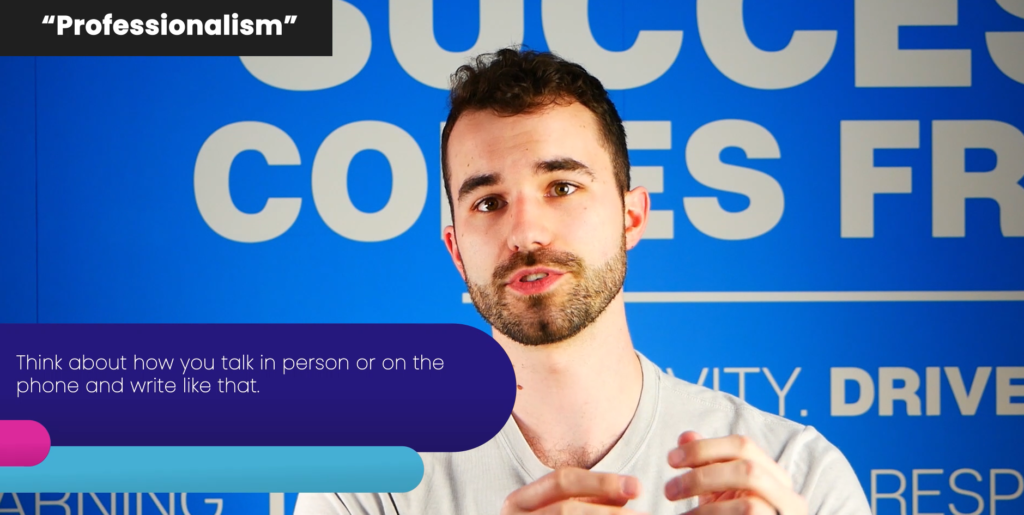
Unlearn “Professionalism”
Stop trying to think about how you should write and instead think about how you -do- talk. You’ve spoken to your customer on the phone, in person, and over email and so you know that you have the right words to sell your product.
I use the word “sell” again because that’s exactly what website content is. You’re not trying to make an academic argument and back it up with research. Instead, you’re trying to sell someone on why your product or service is a good fit for them.
To further my point, I find that writing closer to the way you communicate in person is a huge benefit because it creates consistency between what people read and what they hear. Our brains are wired to love consistency and authenticity, so be exactly as jokey or serious as you would be on the phone with a customer.
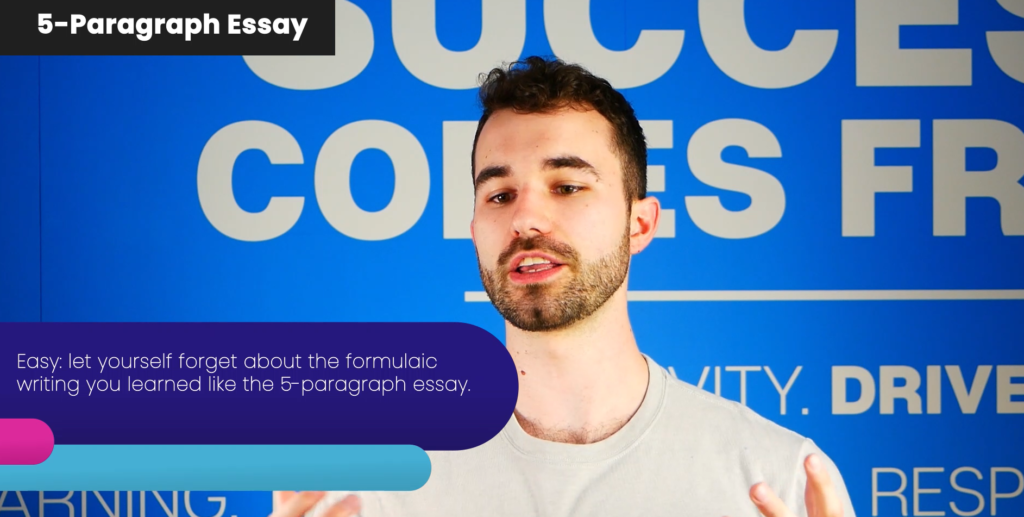
Unlearn the dreaded 5-paragraph essay
This one’s probably the easiest because, most likely, you’ve already forgotten all about it. The key takeaway here is to let yourself forget about it.
The trouble we run into is trying really hard to remember how we think we’re supposed to be writing, but remembering this will only make you worse.
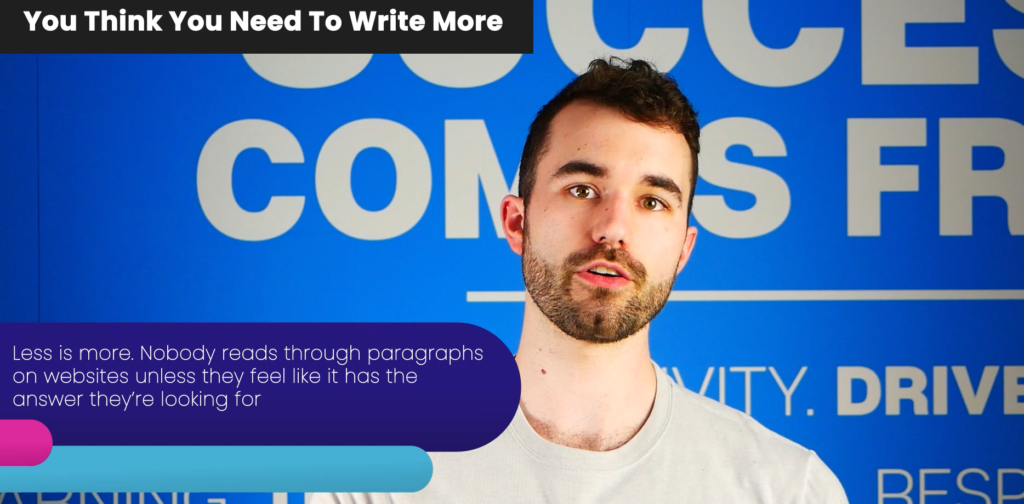
Unlearn feeling like you need to say more than you actually do
Less is more.
We don’t like reading business’ content. We skim for a few seconds and then we give up and look somewhere else. We read titles and look at pictures, but we’re not going to dive into a paragraph without thinking it has something valuable for us.
You don’t need to fit your services information into a 4000 word essay. All you need to do is give enough information to let the reader know you offer the kind of product or service they’re looking for. That’s it.
You almost want to give them too little information so you can get them to call you or book an appointment to discuss your product or service. This gives you an opportunity to assess their wants and needs and start selling.
Don’t fall into the trap of thinking your customer needs all of the information you have. If you overload them, they could think “this is everything they offer and it doesn’t fit my needs” or more likely and much worse, they’ll think “this is too much information; I’m not going to read it.”
Disclaimer: I always have to include these disclaimers because businesses are different. You may require detailed information if it’s what your customer needs to know in order to call you. Whatever reason you think you have for including information, just make sure it’s what multiple customers need to know. Don’t go down the rabbit hole of trying to answer every question anyone’s ever asked you.
Conclusion
Stop trying to write some certain way you think you’re supposed to. Think about how you sell or describe your product or service in person and over the phone and write it down the same way. If you can talk to a customer, you can write to a customer.
Be concise, be authentic, and give the minimum level of detail required.


